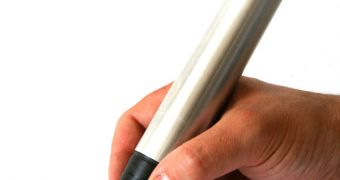A PhD candidate at the Technische Universiteit Delft (TU Delft) announces the development of a new device shaped like a pen, which is capable of detecting elevated stress levels in its users. It can also help reduce those levels, according to its creator.
Researcher Miguel Bruns Alonso, who will receive his PhD degree for this study tomorrow, December 23, says that the stress pen is part of a new generation of products, that will be able to interpret and respond to their users' moods.
In a series of experiments the expert conducted with the new pen, average heart rates of people under stress dropped by as much as 5 percent, which is significant for reducing heart risks considerably over an entire life span.
“That is why I have developed a pen which can detect ‘nervous’ movements and determine whether the user is stressed,” the PhD candidate explains.
“The pen also provides a counterweight to these movements using built-in electronics and electromagnets. When it detects the quicker movements associated with stress, the pen gradually becomes more difficult to move around,” he adds.
“This encourages users to move in a more relaxed way, which in turn makes the pen yield more easily again,” explains Alonso, who is studying industrial design.
One of the reasons why he decided to conduct this research was because he noticed that people have the tendency to play with their pens in their hands when they are tense or stressed.
But the people can gain more control over a situation if they are aware of it. This is the principle on which the stress pen is based. If people handling it become aware of the fact that they are agitated, then they might find it easier to quit being so.
“Sensors in a pen could provide an unobtrusive way of measuring stress levels. Giving users the right feedback could then help them deal with their stress in a constructive way,” Alonso believes.
At this point, the pen is still a prototype, and not available commercially, a TU Delft statement says.
“The conclusion to be drawn from this is that products which seek to reduce short-term stress should, preferably, intervene directly to modify that behavior, rather than warning the user about their stress levels, for instance,” the PhD candidate says.
“This could allow products to reduce stress in an unobtrusive way,” he concludes.

 14 DAY TRIAL //
14 DAY TRIAL //